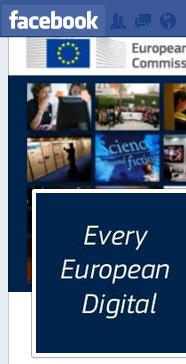Trending on Twitter isn't a traditional political goal. Nor is having a Facebook page with thousands of friends. But that's exactly the point. The European Commission's Digital Agenda for Europe doesn't want old school methods to talk to citizens or to broadcast its views. Instead, it wants to involve every European in critical decisions that will help stimulate Europe's digital economy – knowing that these decisions are tightly linked to the European Union's entire future.
June 25, 2012

By Camille Mendler
Trending on Twitter isn’t a traditional political goal.Nor is having a Facebook page with thousands of friends.
But that’s exactly the point. The European Commission’s Digital Agenda for Europe doesn’t want old school methods to talk to citizens or to broadcast its views.
Instead, it wants to involve every European in critical decisions that will help stimulate Europe’s digital economy – knowing that these decisions are tightly linked to the European Union’s entire future.
Lead by example
No slouch on Twitter herself, Digital Agenda commissioner and EC vice president Neelie Kroes(46,376 tweeps) is not alone among her peers to embrace social media.
This was fully in evidence last week during the Digital Agenda Assembly, a two-day EC-run conference where the #da12 hashtag reached out to an estimated 20 million people – that’s 4% of the European Union’s population.
Physically run in Brussels, the eight workgroup discussions – with topics ranging from broadband, cloud computing, e-commerce and entrepreneurship – were streamed live, tweeted, Facebooked and blogged.
We want you
But don’t call this e-government. This is We-Government, an emerging term for the use of digital social tools between citizens and governments to interact, co-create and solve problems.
Can such methods succeed? #da12 was not a discussion among mandarins. Stakeholders included a farmer leading a community fiber network build in rural England (see the excellent B4RN project), technology leaders like Alcatel-Lucent’s Ben Verwaayen and many others.
Nor was this political debate controlled via airbrush, satellite outage or truncheon.
Critics might say that no decisions were reached, that #da12 was just a talking shop. But that will only be true if the fundamental purpose of We-Government is ignored.
Now, it really is up to us.
Read more about:
DiscussionYou May Also Like






.png?width=300&auto=webp&quality=80&disable=upscale)


_1.jpg?width=300&auto=webp&quality=80&disable=upscale)


.png?width=800&auto=webp&quality=80&disable=upscale)